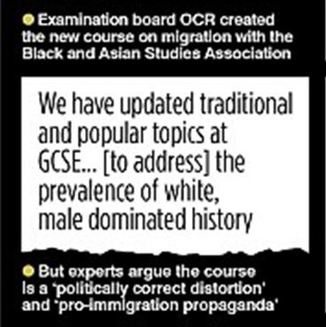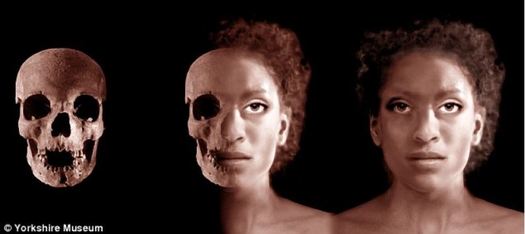British Black Presence from the Roman Period to the
Present Day and the new GCSE 'Migration in Britain' Module
By Martin Spafford
|
There are four parts to this essay.
Click on the titles below. Part One: Africans in Roman Britain (this page) Part Two: Africans in Medieval and Tudor England Part Three: Africans in Seventeenth- and Eighteenth-Century Britain Part Four: Africans in Nineteenth- and Twentieth-Century Britain (and the OCR Migration Course) |
Martin Spafford is a retired history teacher with a career that spanned nearly four decades. During that time he taught in London, South Yorkshire and further afield in Swaziland and Egypt. He has recently been involved in the development of the new OCR GCSE History Curriculum Migration to Britain and has co-authored the supporting text.
The following text is more or less the content of a talk given by me at the ‘African Stories in Yorkshire’ event at WISE (Wilberforce Institute for the study of Slavery and Emancipation) in Hull on 19 February 2016, to accompany a slide show of images.
|
Part One: Africans in Roman Britain
|
“Top authors slam outrageous distortion of history” screamed The Mail on Sunday on 9 January this year: “GCSE pupils to be taught that the nation's earliest inhabitants were Africans who were in Britain before the English. GCSE students are to be taught that some of our nation’s earliest inhabitants were Africans who arrived here long before the English. The Mail on Sunday has discovered that the extraordinary rewriting of our island’s history – the politically correct work of a Marxist academic – will be offered to thousands of history students throughout England from September. Its creators claim the course addresses the ‘white male-dominated’ view of history – but it has outraged some of Britain’s most eminent thinkers. But there is no evidence they ever settled... Sir Roy Strong said: ‘The only Africans who came here were a few with the Romans who came and then left! I find it disturbing that our children should be taught something that is clearly designed to feed into contemporary problems rather than tell our island’s story properly.’ V. S. Naipaul added: ‘This absurd supposition of Africans inhabiting Britain before the English only goes to show how our once esteemed centres of learning, Oxford and Cambridge, have been insidiously eroded by a dangerous dogma that, very like IS today, wrought misery and havoc in Russia, China and the Eastern bloc, where for all practical purposes it has failed.’ Professor Alan Smithers, of Buckingham University, a specialist adviser to the Commons Education Committee, said: ‘This seems to be aimed more at indoctrination than education. It is dangerous because a cohesive society depends on an authentic shared view of history.’” |
This was a reaction - repeated later in its sister paper The Daily Mail - to the new OCR GCSE History course which includes an option on the history of Migration to Britain over the last thousand years. In the same issue, the Mail on Sunday’s editors commented: “Education? No, ludicrous propaganda. Take the inclusion of the fact that African soldiers were stationed at Hadrian's Wall during the Roman Empire. It might be an interesting answer to a quiz question. But to base a statement that 'there were Africans in Britain before the English came' is propaganda, not learning. They were here as temporary occupying troops, much as British soldiers were once in Somaliland. They were not here as part of the general population, and they did not remain long. This is similar to New Labour's misleading claim – as it flung open the nation's gates to unprecedented levels of migration – that this was a 'nation of immigrants'.” |
|
|
However, only a year earlier (3rd December 2014) The Daily Mail had written, commenting on the same course: |
“From the earliest times, immigration has played a central role in shaping the story of our maritime nation. Indeed, there can barely be a British citizen alive without ancestors from overseas – whether Saxon, Roman, Jewish, Irish, Indian, African or from anywhere else. So we cautiously welcome the proposal... for teenagers to have lessons in 2,000 years of migration to Britain as part of a new history GCSE.”
|
And as for the claim that there was ‘no evidence’ that Africans settled in Roman Britain, the editors of the Mail needed only to check their own articles, in one case only a month earlier: |
|
Daily Mail, 28th February 2010
“Revealed: the African queen who called York home in the 4th century. Startling new forensic research has revealed that multicultural Britain is nothing new...”
Daily Mail, 26th January 2011
“Found in a Warwickshire cemetery a long way from home, the African immigrant from 300 AD. The discovery suggests that African immigrants lived far afield of major settlements as early as the third or fourth century..."
Daily Mail, 15th December 2015
“Analysis of four skeletons reveals London’s ‘melting pot’ heritage. ... ‘Every first-generation Londoner was from somewhere else - whether it was somewhere else in Britain, somewhere else on the continent, somewhere else in the Mediterranean, somewhere else from Africa.'...The team also analysed the skeleton of a teenage girl found at Lant Street, Southwark, to find she had blue eyes and maternal ancestry deriving from southern-eastern Europe and west Eurasia. However stable isotope evidence shows that she was born in North Africa... A man discovered at Mansell Street, near the Tower of London was born in the city, though his maternal ancestry shows links to Europe or North Africa.”
“Revealed: the African queen who called York home in the 4th century. Startling new forensic research has revealed that multicultural Britain is nothing new...”
Daily Mail, 26th January 2011
“Found in a Warwickshire cemetery a long way from home, the African immigrant from 300 AD. The discovery suggests that African immigrants lived far afield of major settlements as early as the third or fourth century..."
Daily Mail, 15th December 2015
“Analysis of four skeletons reveals London’s ‘melting pot’ heritage. ... ‘Every first-generation Londoner was from somewhere else - whether it was somewhere else in Britain, somewhere else on the continent, somewhere else in the Mediterranean, somewhere else from Africa.'...The team also analysed the skeleton of a teenage girl found at Lant Street, Southwark, to find she had blue eyes and maternal ancestry deriving from southern-eastern Europe and west Eurasia. However stable isotope evidence shows that she was born in North Africa... A man discovered at Mansell Street, near the Tower of London was born in the city, though his maternal ancestry shows links to Europe or North Africa.”
|
The truth, as ongoing work by archaeologists and genetic biologists continues to reveal, is that when Britain was ruled from Rome people settled here who had come from all over the Empire, including North Africa, the Balkans and Western Asia (the Middle East). In British Archaeology 77 (July 2004), Dr Richard Benjamin of the University of Liverpool wrote: |
|
|
“Archaeology and heritage, the way they are taught and presented, have enormous ramifications for Black communities and wider British society. Archaeology can show that Britain since antiquity has been a diverse, multi-ethnic and multicultural nation, something that needs remembering more than ever today” |


